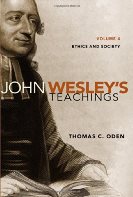Reviewed by David W. Jones
Author
Thomas Oden is Director of the Center for Early African Christianity at Eastern University and Henry Anson Buttz Professor Emeritus of Theology and Ethics at Drew University. As a respected Wesleyan scholar and ordained Methodist minister, Oden is well qualified to write John Wesley’s Teachings.
Series & Focus
John Wesley’s Teachings is a four-volume set in which Oden seeks to give a systematic exposition of John Wesley’s theology that encompasses all of his writings. This book on ethics and society is volume 4 in the series. In order of publication, the subject matter of the three previous texts is: God and providence, Christ and salvation, and pastoral theology.
Purpose
Oden has a dual purpose in writing the present volume. First, contrary to much popular perception, Oden seeks to demonstrate that Wesley was both systematic and consistent in his theology and ethics. Second, and more practically, Oden notes his purpose in writing this book is “to deliver to the nonprofessional reader the gist of Wesley’s teaching on basic questions of the daily practice of the Christian life” (15).
Oden on Wesley
To be clear, John Wesley’s Teachings is not an assemblage of Wesley’s own writings. Rather, this book consists of Oden’s systematized exposition of Wesley’s thoughts. Oden explains, “I do not attempt to provide an account of the development of Wesley’s thought nor a commentary on his works, but rather an analytical elucidation of his arguments” (16). Indeed, Oden’s task is quite a feat, as Wesley produced an enormous body of literature, including 151 teaching homilies, six decades of journals, as well as volumes of diaries, letters, and doctrinal tracts, among other writings. Within this book Oden only works with and from Wesley’s primary source writings.
Structure & Overview
Structurally, John Wesley’s Teachings consists of ten chapters divided into four main sections: social ethics, economic ethics, political ethics, and theological ethics. Each chapter within these four sections contains a brief introduction, followed by a detailed content outline presenting Oden’s exposition of Wesley’s material on a given topic. Issues addressed within this work are wide ranging and include wealth, poverty, gambling, alcoholism, prostitution, and slavery, among many other topics. This book also contains Wesley’s thoughts on moral topics related to 18th-century politics, as well as foundational issues in biblical and theological ethics.
Observations
There are many aspects of John Wesley’s Teachings for which the book can be commended. Oden’s exposition of Wesley’s thought is fair, accurate, and exhaustive. Those familiar with Wesley’s works will not charge Oden with distorting Wesley’s thoughts or cherry-picking from the primary sources.
Additionally, the form and features of this volume are very user-friendly. For example, Oden includes helpful “For Further Reading” lists at the conclusion of each chapter, and this book has thorough subject and Scripture indices.
Moreover, there is a helpful appendix to John Wesley’s Teachings that some readers—especially Wesley scholars—may find worth the price of the book. This appendix contains a valuable correlation of sermons between the most popular editions of Wesley’s works.
It is difficult to critique John Wesley’s Teachings, for within this text Oden is merely expositing and ordering Wesley’s own ideas. Some readers may feel Oden’s systematizing is forced at places; other readers might be disappointed not to find material on moral topics that are pressing in the modern day; and readers with a more reformed theological perspective will disagree with Wesley’s theology at the usual places. Yet, these critiques are all either subjective in nature or outside the scope of Oden’s purpose in issuing this volume.
Assessment
In summary, John Wesley’s Teachings is a fine volume that will benefit readers both within and outside of the Wesleyan tradition. This book ought to find its way on to the bookshelf of students, pastors, and interested laypeople alike.
David W. Jones (PhD) is Associate Professor of Christian Ethics at Southeastern Baptist Theological Seminary and Research Fellow in Christian Ethics at the SBC Ethics & Religious Liberty Commission’s Research Institute.
